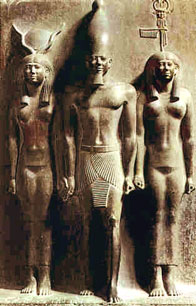"The triumphal hymn of Moses had unquestionably a religious character about it; but the
employment of music in religious services, though idolatrous,
is more distinctly marked in the festivities which attended the erection of the golden calf." (Smith's Bible Dictionary, Music, p. 589).
Jesus said that God will only SEEK the worship of those SEEKING Him through THE TRUTH in the Most Holy Place or the human SPIRIT. "In spirit" does not mean enraptured or "raped" but in the PLACE of the human mind
The primary WORSHIP word used by Paul means to GIVE HEED to Christ by giving attendance to the reading of HIS songs and sermons. End time "worship" will restore Jewish worship which was Egyptian (Babylonian, Canaanite) worship where "services" will be filled with IMAGES of sight and sound to deliberately destroy the human spirit's attempt to THINK or GIVE HEED to God. In imitation of the worship of the Egyptian triad of Osiris, Isis and Horus under the golden calf the naked music at Mount Sinai is repeated by non-sedentary (none silent) performing women who are uncovered in the sense that preside over women cannot escape exercising the AUTHORITY Paul warned against which is AUTHENTIA or power which is both "erotic and murderous."
Music was connected to the Egyptian Trinity at Mount Sinai. This was musical idolatry partially defined below:


"The worship of Isis, and common with her, was daily, and began before dawn.Priests carefully trained in mystic theology, liturgies, and symbolism, accompanied by attendants,On festivals the main service took the form of a drama of divine sacrifice, the passion of Osiris.
all clad in appropriate vestments,
came into the presence of the deities.
"A burnt offering was then presented,Osiris and or Seraphis, Isis, Horus, and others, the faithful being in front of the sanctuary. The first great sacred act consisted in the exposing to the view of the assembled congregation the sacred image of Isis. Before the image libations of holy Nile water were poured out, and the faithful were sprinkled with it.
The sacred fire (incense) was kindled, after which the high priest awakened the goddess in an address uttered in the sacred Egyptian language.
accompanied by singing and music; and finally the goddess was ceremoniously clothed, adorned, and adored.The second service took place in the afternoon, which consisted chiefly of prayer and meditations before the images and symbols of the gods and which closed with music and antiphonal singing.
A third service, quite brief... left Isis unclothed in her quiet temple... The two great autumn and spring festivals featured the death and resurrection of Osiris... and it was expressed with all the symbolism, mystery, music, singing, ritual, and pagentry...
it was calculated to stimulate the deepest religious emotions, and fan the flames of ecstatic joy." (Fairservice, Walter A., Jr, The Ancient Kingdoms of the Nile, p. 171-172, Mentor).
John Calvin on Psalm 71:22. We are not, indeed... are banished out of the churches by the plain command of the Holy Spirit, when Paul, in 1 Corinthians 14:13, lays it down as an invariable rule, that we must praise God, and pray to him only in a known tongue. By the word of truth, the Psalmist means that the hope which he reposed in God was rewarded, when God preserved him in the midst of dangers.
[Note: Paul connects speaking in tongues and musical instruments which are only useful for signalling in warfare if you interpret the message before you sound it]
The promises of God, and his truth in performing them, are inseparably joined together.
Unless we depend upon the word of God, all the benefits
which he confers upon us will be unsavoury or tasteless to us; nor
will we ever be stirred up either to prayer or
thanksgiving, if we are
not previously illuminated by the Divine word.
So much the more revolting, then, is the folly of that diabolical man, Servetus, who teaches that the rule of praying is perverted as if we could have any access into the presence of God, until he first invited us by his own voice to come to him.
This is why Paul absolutely insisted that the assembly (synagogue) TEACH one another with Biblical Resources. To do otherwise is to HIDE THE TRUTH from our children and ourselves.
Counter atted at 4065 Rev 6.21.07 3036
1121 8.22.06 7:02p p.8
12.05.04 5:12 p 203